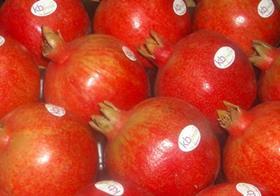
India is struggling to meet international demand for its pomegranates with supply volumes plummeting and prices spiking as a result of bacterial blight disease.
The disease has had a catastrophic effect on the industry and fresh produce supplier Neel Agrotech last year lost 65 per cent of its crop to the bacteria, and an additional 15 per cent to extreme weather conditions.
FreshAcres Agri India, a joint venture between Dutch company Fruit World Breda and NatureFresh Logistics in India, has temporarily ceased production because of the disease. “We decided to stop until we could guarantee a stable supply. Fortunately the problems seem to be solved, enabling us to start up again in September/October,” said the joint venture’s project leader Michael Aagaard.
Importers have reported sourcing fruit from the Asian nation has been close to impossible. “India’s huge issues with bacterial blight in 2011 reduced our imports to almost nothing,” reported Dutch company Nature’s Pride import manager Pieter Quartel.
The decrease in total production has also affected trade out of areas untouched by the disease. India’s largest exporter of fresh pomegranates Kay Bee Exports reported high prices for the commodity have sent its total exports plummeting to a fraction of the 1,000 tonnes it would typically export to Europe, despite it sourcing fruit exclusively from growers unaffected by the disease.
With India unable to supply the European market importers are looking elsewhere to meet demand. “The gap that India leaves is being filled by other countries such as South Africa and Peru,” says Mr Quartel. “As long as the situation is like this we will have less volumes from India and more from other countries.”
The disease has also led to food safety concerns with many growers in the industry using additional chemicals to protect crops.“India has multiple issues: one, the bacteria issue, and next to that the residue levels, which form another problem,” says Niels Stolk of Dutch fresh produce importer Cool Fresh International. “Even when they are GlobalGAP-certified, it is no guarantee of safety.”
Seasonz International managing director told Fruitnet.com growers in the country are losing site of in the importance of domestic markets as they deal with the more pressing issue of crop protection.“The challenge is to keep the growers motivated enough to ensure controlled pesticide usage, especially for EU markets. A grower’s concern is to save his crop today and worry about the market options later,” he said.






No comments yet